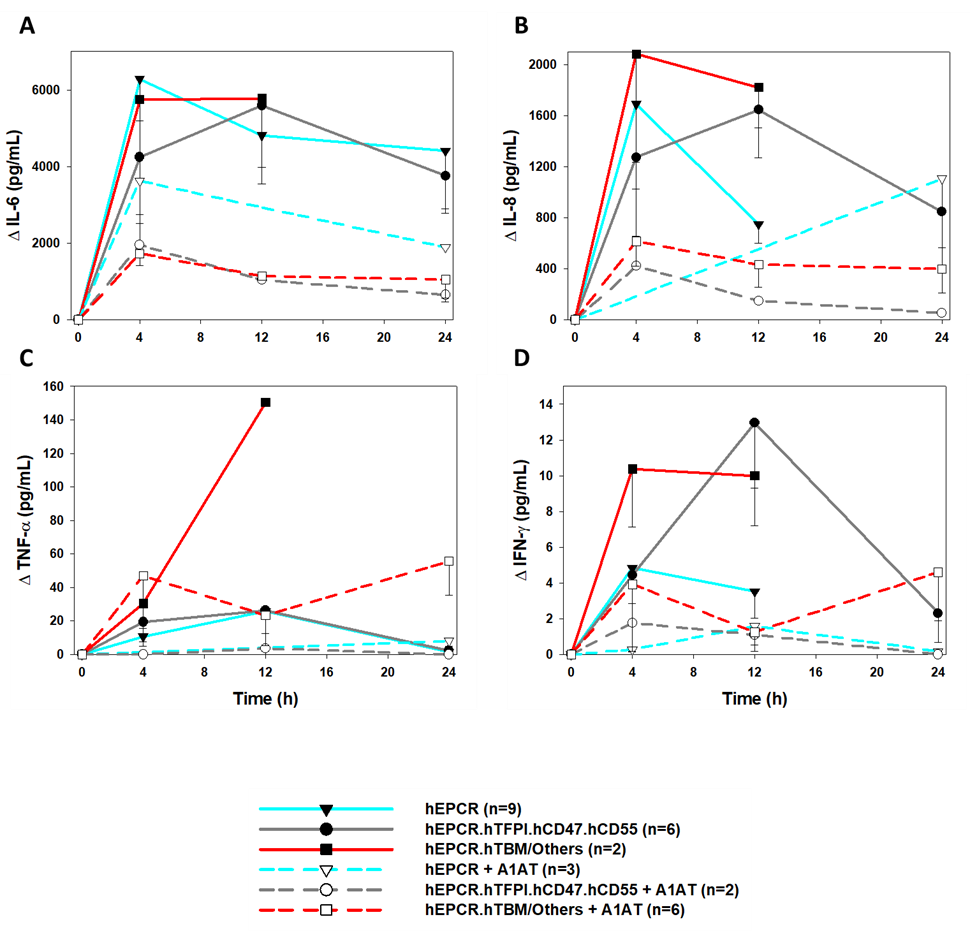Alpha 1-antitrypsin Reduces Cytokine Elaboration in a Xenogeneic Lung Transplantation Model
1Surgery, Center for Transplantation Sciences, Massachusetts General Hospital, Boston, MA, 2Surgery, University of Maryland, Baltimore, MD, 3Revivicor, Blacksburg, VA
Meeting: 2021 American Transplant Congress
Abstract number: 346
Keywords: Inflammation, Lung transplantation
Topic: Basic Science » Xenotransplantation
Session Information
Session Name: Xenotranplantation and Preclinical Studies
Session Type: Rapid Fire Oral Abstract
Date: Tuesday, June 8, 2021
Session Time: 6:00pm-7:00pm
 Presentation Time: 6:20pm-6:25pm
Presentation Time: 6:20pm-6:25pm
Location: Virtual
*Purpose: Novel gene editing techniques have facilitated the generation of donor pigs with multiple genetic modifications, used for xenolung transplantation. Several rejection pathways, including antibody binding, complement and coagulation activation, have been identified, leading to inflammation with cytokine release. Here we tested in a rigorous lung transplantation model whether Alpha 1-Antitrypsin (A1AT) treatment reduces cytokine release and improves survival.
*Methods: GalTKO.hCD46 porcine lungs, additionally expressing hEPCR or hEPCR.hCD47.hTFPI.hCD55 or hEPCR.hTBM/others were used in 17 single lung transplants into baboons. In 11 further transplantations, recipients were additionally treated with A1AT. All recipients received a “platform drug regimen” including steroids, sC1Inh, thromboxane synthase inhibition, anti-histamine, and αGPIb Fab. Immunosuppression consisted of αCD20, ATG, MMF, αCD40. Donors were treated with Desmopressin to deplete pig endothelial vWF. Quantification of cytokines was done by Luminex assay, using baboon plasma, collected at baseline, 4, 12 and 24 hours after reperfusion.
*Results: A1AT treatment was associated with reduced elaboration of IL6, IL8, and IFN-γ for all tested pig genetic cohorts (Fig.1 A, B, D). TNF-α showed lower values in the hEPCR and hEPCR.hCD47.hTFPI.hCD55 groups but not with hEPCR.hTBM lungs at the 4h time point (Fig.1 C). A1AT was also associated with longer recipient survival, including the two longest survivors in the hEPCR.hTBM group (7 and 9 days) in this analysis.
*Conclusions: The results of this study demonstrate that xenogeneic lung transplantation leads to a significant inflammatory response with high cytokine release. Within the analyzed lung phenotypes, A1AT treatment was associated with a trend toward attenuated cytokine elaboration and prolonged recipient survival, suggesting that A1AT attenuates proinflammatory pathways critical to xenografts injury. Further mechanism-directed transgenic modifications and drug treatments may facilitate clinical translation.
To cite this abstract in AMA style:
Burdorf L, Laird C, Zhang T, Connolly MR, Habibabady Z, Pratts S, Miura S, Pollok F, Eyestone W, Phelps CJ, Ayares DL, Azimzadeh AM, III RNPierson. Alpha 1-antitrypsin Reduces Cytokine Elaboration in a Xenogeneic Lung Transplantation Model [abstract]. Am J Transplant. 2021; 21 (suppl 3). https://atcmeetingabstracts.com/abstract/alpha-1-antitrypsin-reduces-cytokine-elaboration-in-a-xenogeneic-lung-transplantation-model/. Accessed February 20, 2026.« Back to 2021 American Transplant Congress

